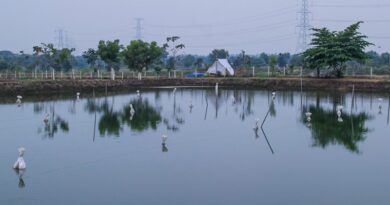‘Josab India is eyeing municipal, community-scale water treatment market’
Stockholm-based Josab Water Solutions AB is one of the few foreign companies that entered India with a diverse product portfolio to tap the growing water treatment market.
Josab’s ecological water treatment plants can be used in a variety of applications such as drinking water, irrigation systems, wastewater purification, industrial water and rainfall run-off water treatment. It also installs water dispensing kiosks or water ATMs.
Its wholly owned Indian subsidiary Josab India Pvt Ltd was set up in 2012 and is one of the three subsidiaries across the world. In India, the company had its primary focus on rural areas, where the access to safe drinking water is bare minimal, but is looking to expand its presence.
Josab India Pvt Ltd’s Managing Director Dennis Abraham talks to India Water Review’s Girish Chadha on the company’s expansion plans in the country.
Josab Water Solutions AB, through its wholly owned subsidiary Josab India Pvt Ltd, is a relatively new entrant in the Indian water market. What prompted the Swedish parent to launch operations in India?
In 2012, I assessed the potential of Josab’s aqualite water treatment prospects in India and started the first subsidiary for Josab in Pune, Maharashtra India. By 2013, Josab water solutions had already bagged water treatment projects with Kerala government. Since then, we have not looked back in the past six years.
We have slowly but confidently grown our business into two more states – Maharashtra and Telangana. We hope to keep up the growing trend and expand to new states in coming years.
On the industrial and commercial side, the demand for process water treatment and wastewater treatment is rising as companies see a rise in water requirement with demand for their goods rising in the wake of a buoyant economy.
Also, with strict government environmental norms making the cost of water pollution high, several small- and micro-industries have tied up to have common wastewater treatment plants set up to ensure that they meet the discharge norms. All of this is keeping the demand for products in this segment high.
After considering all these parameters, Josab International AB decided to step in to the Indian market to cater to the needs in water treatment and wastewater treatment.
Can you lay out the landscape in India in terms of current product and solutions portfolio? Which sectors does Josab cater to? Give us some idea of your marquee projects in India so far.
Josab provides ecological water treatment solutions for all type of applications, from domestic equipment to industrial scale turnkey projects. Our wide range of products, technologies and extended know-how in all water-related sectors will guarantee cost-effective and high efficiency solutions to address various water quality requirements.
Josab’s ecological water treatment plants can be used for a variety of applications such as:
- Water ATMs (For schools, hospitals, public areas etc)
- Community scale drinking water purification systems (Villages, municipalities etc)
- Municipal water treatment systems
- Sanitation & toilet waste treatment
- Contingency/disaster relief mobile units
We have a large application area. Our treatments solutions can be used in large to small potable water treatment market; the primary or tertiary wastewater treatment; ship ballast systems; animal husbandry, poultry, aquaculture; and distilleries, food processing, etc.
What are the key technology offerings by Josab in the Indian market? Are all the products from the global range available in India or do you think the market is not mature enough to sustain all products, as yet?
Josab specializes in providing innovative solutions for water treatment and purification. We do this using our company’s own, patented and unique natural mineral called Aqualite, which is a natural zeolite. All the products from Josab global range are available in India.
We, at Josab, believe in providing ecological and sustainable solutions more than anything else. For example, if someone comes to us with water quality issues or a requirement for a water treatment plant, we will not jump into ‘one size fits all’ kind of solutions which are neither ecological nor sustainable. Instead we try to analyse the root cause of the contamination, the exact treatment method/technology that is required to remove the contaminants while trying to retain the life in water, which are nothing but ‘minerals’ and also see that the system runs smoothly for at least 10 years.
Access to safe drinking water is part of the Indian Government’s overall vision of sustainable water management. How is Josab helping in this endeavor and what is the size of the market it is operating in?
Water in India has always been considered a free and infinite resource and the governments have never laid emphasis on educating the masses on the importance of water conservation and water treatment. Of late, research has been put into understanding the causes of several diseases that weren’t prevalent a decade ago. Most of the researchers have concluded that the major cause of these diseases is associated with quality of water consumed. This has raised eyebrows and the entire industry and policymakers have started to put emphasis on the importance of education on water quality.
We see that efforts are underway from most of the stakeholders but more efforts are to be put to educate people and we hope we are doing our part to provide best quality water to the common man.
Josab’s presence seems to be largely in the municipal market in India. What is the company doing to expand its presence in India and how is it competing with several Indian and foreign companies offering somewhat the same products and solutions? What are the company’s plans to expand in the vibrant industrial market in India, particularly units that need pure water?
Our potential clients are the Government of India and the governments of different states in India, industries and institutions like schools, hospitals, private industries etc. Currently, we are working on providing municipal-level water treatment plants, community-scale water treatment units, smart city decentralized water treatment systems and solutions.
Which other sectors look most promising in India? Also, how is Josab looking to expand geographically within the country?
The agriculture sector is a growing market too as more farmers adopt new irrigation techniques. Water scarcity across several regions in the country is driving farmers away from the traditional methods of flood irrigation. So, companies that make drip and micro-irrigation systems are having a field day, with rising demand for their products leading them to expand capacities and look for acquisitions to gain new markets. Even water pipes makers are seeing a rise in demand in this sector.
In the household sector, domestic water treatment is a rapidly growing industry. There are now several local and foreign manufactures of home-based water treatment and purification systems, a testimony to the fact that the Indian consumer is getting increasingly conscious of the ill-effects of drinking polluted water.
Since most of the water utilities in Indian cities have old water pipeline infrastructure, people are not taking chances with their health and are investing in water treatment systems. This has led to unprecedented competition in the market as several established players jostle for market share with new entrants and small and regional players make a dent in the unorganised market.
What kind of revenue does Josab generate in the Indian market? How is 2019 and 2020 looking in terms of topline and bottomline? What contribution does Josab make to its parent company’s overall revenue figures?
Well, being a listed firm, our revenues and profits are transparent. With regards to the business in India, I may not be able to specify numbers but I can affirm that we have been making steady progress. In terms of overall business, Josab India is a substantial contributor to the parent company.
What is the current production capacity, if any, of Josab’s range in India? Are some products being imported in India? Is Josab looking to ramp up production capacity and by how much?
As we are operative pan-India, We have local and regional authorized manufacturers who make the systems based on our design and specifications. Hence, we are capable enough to handle projects of any scale and also, our manufactures are ISO certified companies and we ensure stringent quality checks to deliver the product as per our standards.
Thereby, neither quality nor time-lines are compromised. The only product we import is our unique mineral Aqualite. It is mined in Hungary and imported in India and the rest of the components and engineering is all indigenous.

